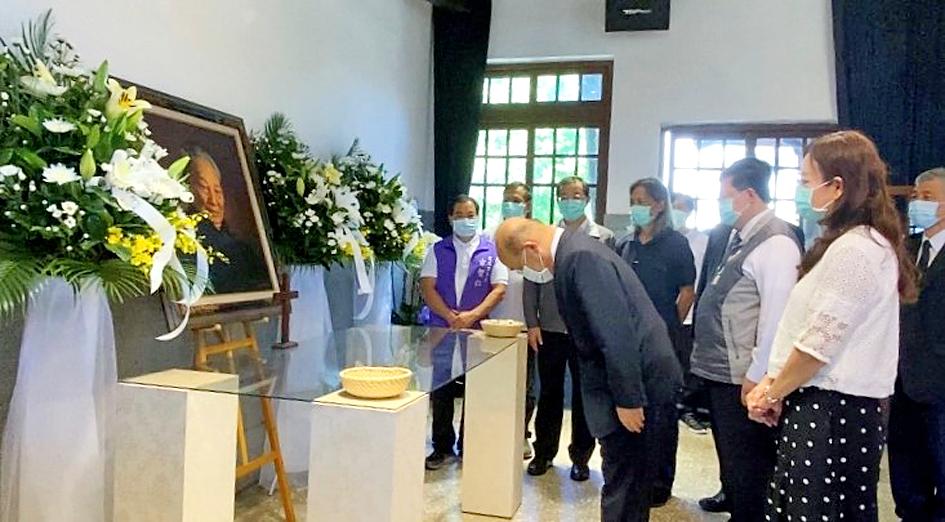A doyen of Taiwan’s “nativist literature movement,” Chung Chao-cheng (鍾肇政) passed away at his home in Taoyuan on Saturday, his family said. He was 95.
Chung’s son Chung Yen-wei (鍾延威) said the family discovered Chung not breathing at about 7pm.
Despite his father’s age, he was in relatively stable health over the past few years, Chung Yen-wei said.

Photo: Chen Ching-min, Taipei Times
The family said it is deeply saddened and shocked by his sudden passing, and is preparing for his funeral.
Born in Taoyuan’s Longtan (龍潭) in 1925 during Japanese colonial rule, Chung Chao-cheng, a Hakka, was widely considered the doyen of the literature movement. He was most famous for his works The Dull Ice Flower (魯冰花), the Turbid Waters Trilogy (濁流三部曲) and the Taiwanese Trilogy (台灣人三部曲).
Director Yang Li-kuo (楊立國) adapted The Dull Ice Flower into a film, released in 1989, that was nominated for six Golden Horse Awards and won two, Best Supporting Actress and Best Original Song.
Chung Chao-cheng’s classics of Taiwanese literature depict the lives and fates of Taiwanese against the background of post-World War II Taiwan, following the end of the Japanese colonial period.
He wrote more than 30 novels and 150 short stories, as well as scores of essays, even though he taught at the Longtan Elementary School until 1979.
In mourning his passing, President Tsai Ing-wen (蔡英文) expressed her condolences to his family and said his death was a great loss to the nation’s literary circle.
In a Facebook post, Tsai also praised Chung Chao-cheng for playing an important role in promoting Hakka culture and Taiwanese literature.
Chung Chao-cheng and other writers of his time had jointly published a regular newsletter during the post-war era called the Literary Bulletin, which proved essential to young and aspiring writers of the time, Tsai said.
Tsai said she would always remember him as an elder who saw her as his own child.
She pledged to bear his teachings in mind to continue the promotion of Hakka and Taiwanese culture so that his legacy would last for generations to come.
Writer Chen Fang-ming (陳芳明) said Chung Chao-cheng had a tremendous impact on the development of Taiwanese literature.
Chung Chao-cheng played a crucial rule during the transitional period in the 1950s after the Chinese Nationalist Party (KMT) took over the governing of Taiwan from Japan, Chen said.
The Hakka Affairs Council said Chung Chao-cheng was not only a prolific writer, but a devoted promoter of Hakka affairs who helped promote awareness of Hakka culture at a national level.

The Grand Hotel Taipei on Saturday confirmed that its information system had been illegally accessed and expressed its deepest apologies for the concern it has caused its customers, adding that the issue is being investigated by the Ministry of Justice Investigation Bureau. The hotel said that on Tuesday last week, it had discovered an external illegal intrusion into its information system. An initial digital forensic investigation confirmed that parts of the system had been accessed, it said, adding that the possibility that some customer data were stolen and leaked could not be ruled out. The actual scope and content of the affected data

‘LIKE-MINDED PARTNER’: Tako van Popta said it would be inappropriate to delay signing the deal with Taiwan because of China, adding he would promote the issue Canadian senators have stressed Taiwan’s importance for international trade and expressed enthusiasm for ensuring the Taiwan-Canada trade cooperation framework agreement is implemented this year. Representative to Canada Harry Tseng (曾厚仁) in an interview with the Central News Agency (CNA) said he was increasingly uneasy about Ottawa’s delays in signing the agreement, especially as Ottawa has warmed toward Beijing. There are “no negotiations left. Not only [is it] initialed, we have three versions of the text ready: English, French and Mandarin,” Tseng said. “That tells you how close we are to the final signature.” Tseng said that he hoped Canadian Prime Minister Mark Carney

POSITIVE DEVELOPMENT: Japan and the US are expected to hold in-depth discussions on Taiwan-related issues during the meeting next month, Japanese sources said The holding of a Japan-US leaders’ meeting ahead of US President Donald Trump’s visit to China is positive news for Taiwan, former Japan-Taiwan Exchange Association representative Hiroyasu Izumi said yesterday. After the Liberal Democratic Party’s landslide victory in Japan’s House of Representatives election, Japanese Prime Minister Sanae Takaichi is scheduled to visit the US next month, where she is to meet with Trump ahead of the US president’s planned visit to China from March 31 to April 2 for a meeting with Chinese President Xi Jinping (習近平). Japan and the US are expected to hold in-depth discussions on Taiwan-related issues during the

President William Lai (賴清德) yesterday bestowed one of Taiwan’s highest honors on Saint Vincent and the Grenadines (SVG) Ambassador Andrea Clare Bowman in recognition of her contributions to bilateral ties. “By conferring the Order of Brilliant Star with Grand Cordon on Ambassador Bowman today, I want to sincerely thank her, on behalf of the Taiwanese people, for her outstanding contribution to deepening diplomatic ties between Taiwan and SVG,” Lai said at a ceremony held at the Presidential Office in Taipei. He noted that Bowman became SVG’s first ambassador to Taiwan in 2019 and